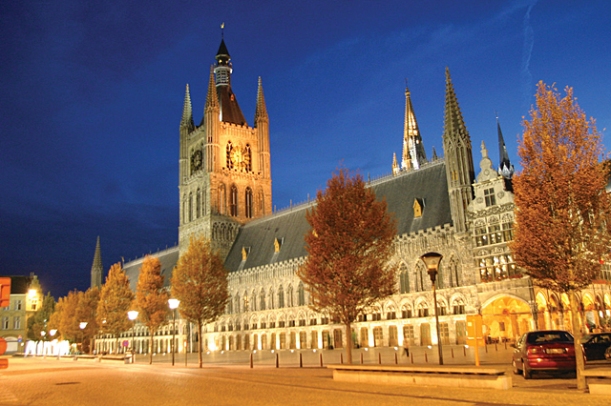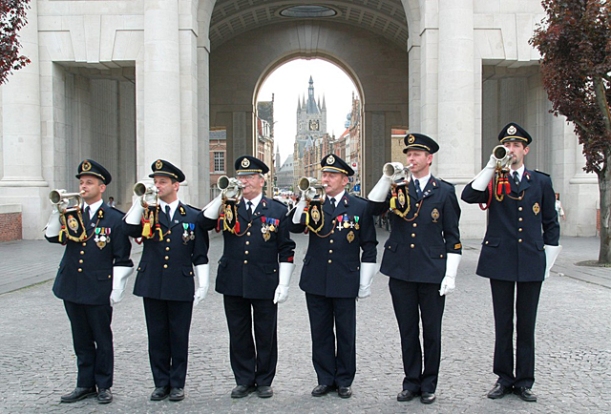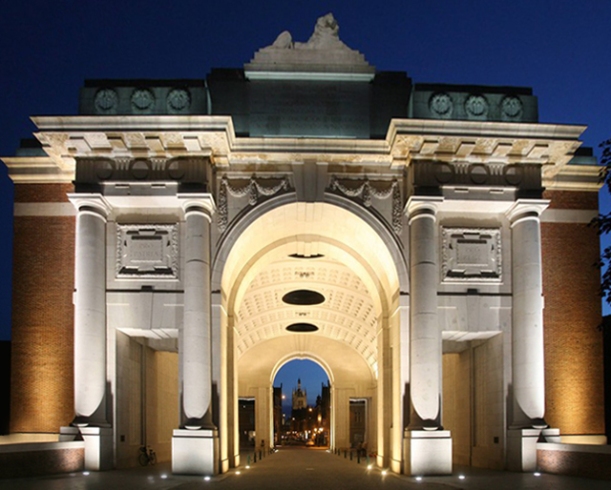Matt, from our Marketing Department, shares his account of his visit to Ypres’ battlefields and cemeteries.
Ypres, in all its cumbersome syntactic finery, is a name burned into the collective psyche of the British people; and, except for maybe the Somme, no other word so quickly conjures up the full horrors of the First World War. The city and the surrounding countryside were so utterly destroyed during the war years that it was barely possible to believe that it was ever a place of human habitation; yet now, beautifully restored and fully cognisant of its past, Ypres is a place of warmth and allure, at once a living monument, and a thriving city gently going about its business.
I came to Ypres with my dad and father-in-law, partly as an interested bystander and partly as a chaperone for two old fellas. I knew of the name, and I’d done a fair bit of reading to fill in the gaps in my knowledge, but nothing truly prepared me for the impact of the trip. We arrived in Ypres just after lunch, on a day of high blue skies, and spent that afternoon slowly idling our way around the city. We peered in awed silence at the names on the Menin Gate (all 54,389 of them, all missing and with no known grave) and visited the Flanders Museum, housed in the beautifully restored Cloth Hall at the heart of the city. We walked atop the old city walls and found a small graveyard, a harbinger of things to come. That evening we and a hundred others listened to the Last Post at the Menin Gate, a ceremony for the dead that has been completed every evening for nearly 100 years. Later that night we roared at one another in smoke-filled bars, borne aloft on the atmosphere; silence was the last things on our minds.
The following day we entered Passchendaele, another name synonymous with mud and slaughter. The town was quiet, sleepy even. It had a bakers, and shoe shop with a sale on. We bought bread and olives and headed out to Tyne Cot, just up the road at Zonnebeke. It’s the largest Commonwealth military cemetery in the world and is the resting place of 11,594 soldiers, and home to another memorial to the missing, inscribed with the names of more than 34,000 British and New Zealand soldiers. The entrance to the visitors centre, and inside the centre itself, has an array of speakers, through which solemn voices read a litany of names – names of those who fell in battles immediately around the cemetery area. This most simple of litanies – a name, an age, a rank – has such power, that one is rendered dumb, speechless. Then there are the graves themselves, beautifully kept in long lines, stark and bone-white under the glare of the sun. We wandered among them, again noting names and ages. At one particular grave, a Welsh family had draped the stone in a flag; they read aloud from a series of letters and sang a song of remembrance.
On the third day we drove west to Loos in France, site of one of the first British assaults on the Western Front in 1915. My dad had a book listing the locations of all 917 Commonwealth war graves in France and his uncle, whose body has yet to be discovered, was listed on a plaque in a cemetery just outside the town. The day was fiercely hot and we carried a frantic air with us as we found two, then three cemeteries – none of which was the right one. Then it came: the Loos Memorial Cemetery, by the side of a nondescript main road. We performed the well-rehearsed glance at names, the by-now vague shudder of recognition at a surname, a place name. We were looking for plaque 91, and after everything there it was, in plain view, in the shade of a walnut tree. Plaque 91.
Standing there, light-headed and swaying slightly in the heat, a simple collection of letters, a known name, and all the abstraction of the last few days was suddenly given focus. I felt the air change shape as the old man breathed deeply, I felt him buckle and turn, bearing away the dark weight of things. I wonder if things of this immensity give us a glimpse of something secret within ourselves. Something usually inviolable. Catching a sight of this space within someone else has the feel of the sacred.
In some strange way, this completed things. We left, newly quiescent, and drove across France back into the welcome flatness of Belgium. That night we roared louder than ever.
Photography courtesy of the Ypres Tourist Board




